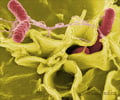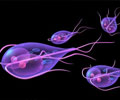At an elementary school in the Senegalese capital Dakar, every classroom is equipped with potentially life-saving tools: a basin and a bar of soap.
Every classroom is equipped with a basin and a bar of soap at an elementary school in the Senegalese capital Dakar.
According to the UN, which launched the first-ever Global Hand-Washing Day on Wednesday, the simple act of washing hands could save thousands of children's lives every day, mostly in Asia and Africa."We have to wash our hands to make sure we have no bacteria," nine-year-old Oumar Seck proudly told AFP at the Point E II school.
"I wash my hands every time I go back in the classroom after playtime and after I go to the bathroom. At home I wash my hands before we eat."
In the Point E neighbourhood of the Senegalese capital, children and the Senegalese minister of health celebrated Global Hand-Washing Day with a special ceremony - but it was a bit like preaching to the choir.
"Here at this school we have been stressing the importance of washing your hands with soap for the last five years, ever since we has a student here from London who launched a program of public health," teacher Daouda Kan said.
In a crowded classroom, children were eager to stress that they washed their hands like they were told.
Advertisement
The UN children's fund, UNICEF, is hoping to spread the school's good example throughout West Africa, were diarrhoea is the third leading cause of mortality among children.
Advertisement
"While many people wash their hands with water, very few use soap, especially at critical moments," she added.
"The evidence we have now is that hand washing reduces the instances of diarrhoeal diseases by 40 percent," said Franck Bouvet, a water sanitation hygiene specialist in UNICEF's regional West and Central Africa office.
"Critical times" to wash hands include before eating or handling food, as well as after using the bathroom or cleaning up a baby, Bouvet said.
UNICEF says if washing hands with soap becomes an ingrained habit it could save more lives than any single vaccine or medical intervention. It stresses, however, that immunization against illnesses such as cholera are also essential.
"The problem is not access to soap because a recent survey showed that some 95 percent of the families here have soap, but they use it for washing their clothes," Bouvet explained.
However, with the rise in cost of living in West Africa due to the high fuel and food prices, "the price of soap is a problem".
"We are seeing that families are adjusting to the higher prices by cutting some expenses and soap is one of those, a recent study in Burkina Faso showed," the water expert said.
Recurring cholera outbreaks in the West Africa region, such as an ongoing epidemic in Guinea Bissau, also show the importance of basic hygiene, said Bouvet.
"One of the seven important ways to prevent cholera is to wash your hands at critical times. With cholera, that also means after caring for a patient or after touching the body of a cholera victim at a funeral," Bouvet explained.
It is not only a problem in developing countries.
A study in Britain showed that people washed their hands after changing a diaper only about half of the time, while a study of US doctors revealed they often forget to wash their hands between patient visits, UNICEF said.
Source-AFP
RAS/SK









